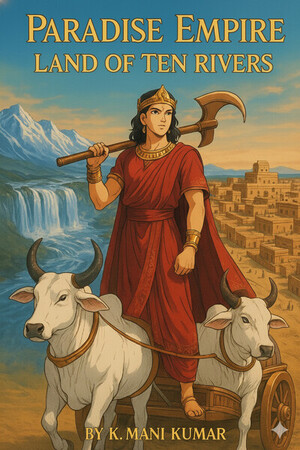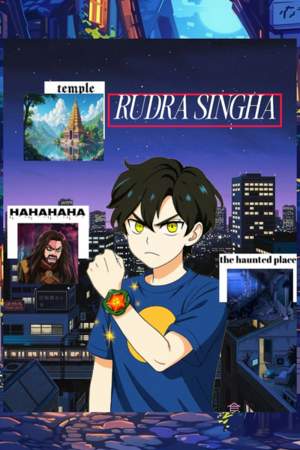Chapter 8:
Chapter 3: Journey Toward Destiny — Part 4:The Race and Change!
The Paradise Empire: The Land of Ten Rivers season 1 part 1
Chapter 3: Journey Toward Destiny — Part 4:The Race and Change!
A Reflection on Change (Scene opens:Present.camp, Night.)
Tim’mayya sat on watch, the night air cool around him. The fire had burned down to a bed of glowing red embers, pulsing in the darkness. He pulled his rough-spun blanket tighter. Across the tent, Vīra slept soundly, his breathing deep and even, a picture of absolute peace. Beside their chariot, the two great zebu bulls were dark, powerful shapes resting under the starlight.
Tim’mayya’s gaze lingered on his friend. The memories of their childhood, stirred up by this journey, were still swirling in his mind.
Tim’mayya’s Voice (narrating): “Change. It’s a strange thing. Change never happens quickly. Most people are like rivers; they carve new paths through stone, but it takes a thousand years of patience. Some may try to change, and others simply can't. The new generations... they look at the old customs, the old ideas, and they are like visitors from another world. They can’t understand them.
But change... it is slow.
That is, unless you are Vīra.
Vīra is not the river. He is the flood. He will die trying, he will push against the mountain until it moves, to achieve what he believes is right. And there was one thing he hated about our village, one custom that curdled his blood: the animal sacrifice.
He wanted to change it. But to change a tradition that old, you don't just need strength. You need leverage.
He found that leverage when we were seventeen, almost eighteen years old. It came, as all great changes do, in a moment of deep, public shame.”
The Council of Shame (Scene shifts: Flashback. A sacred grove, halfway between the five villages. Midday.)
Tim’mayya’s Voice (narrating): “Kīlūru, Lēkūru, Avunūru, Mūvūru, and our own Manūrū... every year, we held a great contest. It was not just a game; it was a matter of village honor. And for Manūrū, those times were hard. We kept losing the main event, the Bullock Cart Race, every single year.
That year, the five village chiefs met at the Grove of Elders to set the terms of the festival.”
The scene is thick with tension. The five chiefs sit on carved stone seats under a massive, ancient platform of thrones. Our chief, Venkatayya, sits with them, his face proud but his shoulders tight. His son, Rangayya, stands behind him, hand on his sword hilt.
The Chief of Avunūru, a large man with a sneering lip, looked across the circle at Venkatayya and laughed.
Avunūru Chief: “So, you came here too, Venkatayya? I am surprised to see you.”
Venkatayya stiffened. “What do you mean by that? Manūrū is one of the Five. We have as much right to be here as you.”
Avunūru Chief: “A right? Really, Venkatayya, don't play the fool. You shouldn't be here! This council discusses winners. It has no room for those who lose every time! We all have won at some point. Kīlūru wins the archery. Lēkūru wins the wrestling. We win the race. But Manūrū? Manūrū loses every time. It’s a waste for you to even try! You fools are a blot on our shared festival!”
The chiefs of Kīlūru and Mūvūru chuckled into their hands.
Young Rangayya, his face burning red, stepped forward. Rangayya (shouting): “Mind your mouth, Chief of Avunūru! This insult will not go unanswered!”
The Avunūru Chief raised an eyebrow, his smile widening. Avunūru Chief: “What are you doing, boy? Barking? A Manūrū dog barks, but has no teeth.”
Young Rangayya drew his bronze sword, its blade singing in the air. Rangayya: “Father! Order me! I will bring their heads and put them at your feet!”
The other chiefs’ guards instantly drew their own weapons, their faces filled with anger. Venkatayya (roaring): “Rangayya! Sheathe your weapon! Now!”
Avunūru Chief: “How dare you, boy! You would be dead before you took a single step. Manūrū fools... you talk much and do little. You and your father should come back when you can actually win. But that will never happen! So get out of here! You fools have no place in this council, or in this race!”
Tim’mayya’s Voice (narrating): “We—Vīra, our fathers, and I—were watching from the crowd. We saw our chief, Venkatayya, his face a mask of stone, turn and walk away. Rangayya followed, his entire body trembling with shame and rage. The silence from the Manūrū crowd was deafening. We had been publicly dishonored.”
The Challenge (Scene shifts: That evening. Venkatayya’s large stone house.)
Venkatayya sat in his grand meeting hall, staring into nothing. His wife brought him water in a fine silver cup, but he didn't see it. His mind was elsewhere, replaying the insults. Rangayya was pacing in the courtyard, hacking at a practice dummy.
Suddenly, Vīra appeared at the entrance.
Tim’mayya’s Voice (narrating): “Vīra just started walking. Straight towards the chief’s house. His father and my father and I... we were all stunned. We just followed him.”
The chief’s guards crossed their spears to block the doorway. Guard: “Halt! The chief sees no one!”
Venkatayya looked up, his voice dead. Venkatayya: “Let them in. What does it matter now?”
Vīra walked forward, his father right behind him, wringing his hands. Vīra’s Father: “Ayyā (Lord)! He is just a boy! He came to your house without thinking! Forgive him, we will leave!”
Vīra: “No.”
Everyone froze. Vīra’s voice was quiet, but it filled the hall. He looked directly at Venkatayya.
Vīra: “Ayyā. I came here to talk with you. It’s about our village’s honor.”
Venkatayya’s eyes widened. Rangayya, hearing this from the courtyard, stopped his pacing and came to the doorway.
Vīra: “I will join the race on behalf of our village, Ayyā. And I will prove to those fools what Manūrū is. I am ready to fight for our village honor.”
Venkatayya looked at this 17-year-old boy. He felt a flicker of hope, but it was buried under decades of failure. Venkatayya: “I am happy that a youth like you is ready to fight for our village... but how, Vīra? They were right on one point. We can't win. Their carts are fast, their bulls are strong.”
Vīra: “Ayyā. Have faith in me. I will go to the race with my own bulls. I will win the race. And I will crush the pride of the other four villages.” He paused, his gaze unwavering. Vīra: “But I need your support for that.”
Venkatayya: “I will give it. But how? How will you do this?”
Vīra: “We are losing the race because our carts are heavy. They are built for farming, for hauling grain. They are not built for speed. I will change it. What if we make a light chariot-cart? With modifications?”
Venkatayya looked at his son, then at his wife. He saw the same desperate hope in their eyes. He looked back at Vīra, at the boy’s impossible confidence. Venkatayya: “Okay, then. I will support you. You will have my finest craftsmen. But you must win this race, Vīra. You must.”
Vīra: “Yes, Ayyā. But after I win... you must grant me one thing.”
Venkatayya: “I will grant you anything. Just win the race.”
The Chariot of Manūrū (Scene shifts: Montage of creation.)
Tim’mayya’s Voice (narrating): “The finest craftsmen of Manūrū were summoned. Vīra, who had never built more than a fence, was suddenly their commander. He was obsessed.
He demanded a new class of vehicle: the racing chariot.” We see Vīra working with the craftsmen, rejecting heavy woods like teak and ironwood, choosing light, durable hardwoods like red Sandalwood and seasoned Neem.
He forced them to study the geometry, stripping the frame down to its bare, high-strength skeleton.
Vīra: “No, the cockpit must be longer, carved to fit me. The wheels must use spokes for lightness. The structure must be built like a war shield—minimal mass, maximum strength.”
They worked on the axle, using spoke-style wheels reinforced with bronze at the rim—strong, but impossibly light.
Tim’mayya’s Voice (narrating): “The true genius was in the connection points. Vīra knew his bulls were fast, but the traditional rigid yoke strangled their speed and stability on turns.”
We see Vīra showing the master craftsman his idea, scratching it into the dirt.
Vīra: “The harness connections must be solid, but they must flex. Instead of rigid bars, we will use thin, hammered copper links, connecting the yoke to the pole. This allows a slight, crucial play, transferring the pull cleanly while absorbing their independent head-toss and stride adjustments.
” Vīra: “And for the pole—the most crucial point—it must allow for lateral shock. The pole must pass through the front axle brace using a mortise and tenon joint. We will line the mortise hole with a polished bronze sleeve and pass a large bronze pin through it.
This will create a limited, low-friction pivot, allowing the pole to swing a few degrees left and right to absorb the lateral shock of a high-speed turn.
By reducing friction and adding strategic flex, we are no longer building a cart; we are building a machine.
” Tim’mayya’s Voice (narrating): “In a few weeks, it was done. It was the first true racing chariot, built on principles of speed, not storage in Manūrū. It was beautiful.
And a few weeks before the race day, Vīra and his father brought that chariot in front of the temple of Manūrāyya and Manūramma. They placed it there for one whole night, for the village gods’ blessings. They say... the gods’ power went into that chariot that night.”
The Race (Scene shifts: The Day of the Race. The Great Field.)
The crowd was massive, a sea of color and noise from all five villages. Venkatayya and Rangayya walked to the ancient platform of thrones.The other chiefs saw them and were stunned.
Kīlūru Chief: “You came too? Don't you people have any shame? How shameless can you be?”
Avunūru Chief: “Calm down. Within a few hours, they will know their place... after losing the race again!”
Venkatayya (smiling): “We will see who will know their real place!”
The riders from Kīlūru, Lēkūru, Avunūru, and Mūvūru arrived with their heavy, solid-wheeled bullock carts.
And then... Vīra arrived.
He drove his two white zebu bulls, his 'brothers'. The chariot behind them looked nothing like the others. It was sleek, light, and seemed to float over the ground. It looked majestic. Sacred. Divine.
The Avunūru chief and the other chiefs were stunned into silence.
Venkatayya (booming): “This is our new cart! And you can't stop us this time. The ancient game rules say the rider must have a vehicle and bulls to join the race. What's the matter? Are you all afraid of losing? If not, what are you waiting for?!”
Avunūru Chief (furious): “Let the race begin! NOW!”
A man raised a massive pedda kommu—a great bronze horn—and blew a long, deep note.
The race started!
Vīra exploded from the start. His bulls, free in their new harnesses, pulled the light chariot with blinding speed. He took the lead in the first few seconds.
The other chiefs were stunned. The riders, realizing the danger, looked at each other. Kīlūru Rider: “Anyone can win, but NOT Manūrū! We must stop him!”
The race was three long laps around the great field. On the first turn, two riders—one from Kīlūru and one from Lēkūru—managed to catch up to Vīra. One pulled up on his left, the other on his right. They began to steer inward, pinning Vīra's chariot between them, their wheels grinding, trying to crush his lighter vehicle.
At the same time, the rider from Mūvūru pulled up behind them and started throwing weighted sticks directly at Vīra!
Vīra looked at his bulls, his voice calm over the roar of the crowd. Vīra: “My brothers... we can do this! Let’s teach these fools a lesson! Now!”
The bulls suddenly jumped. It was not a simple surge; they leaped forward as one, pulling the chariot wheels lifting off the ground for a heartbeat before slamming back down.
The two carts that were pinning Vīra, now pushing against nothing, smashed violently into each other. They crashed in a tangle of wood and roaring bulls. The rider from Mūvūru, unable to stop, went straight into the wreckage and was thrown.
Only two remained. Vīra... and the rider from Avunūru.
The Avunūru rider whipped his bulls, trying his best to reach Vīra, but his heavy cart was no match. Vīra and his bulls crossed the end point, the crowd watching in stunned silence before the entire Manūrū contingent erupted.
Manūrū WINS!
Venkatayya and Rangayya saw it. Venkatayya threw his hands in the air and shouted: Venkatayya: “HA! PRIDE OF MANŪRŪ! OUR VĪRA!”
He slammed his chest with pride and then turned, his face terrible, to the other chiefs. Venkatayya: “Do you understand what your place is now, Chief of Avunūru?!”
Young Rangayya stepped forward, his hand on his sword, but he didn't draw it. He just smiled. Rangayya: “I don’t need your heads anymore. They are worthless now. So keep them to yourselves.”
All the other chiefs put their heads down, their faces dark with shame. They had nothing to say. They couldn't.
The Boon
People from behind: Vira! Vira! Vira!
Venkatayya came down from the stands. Vīra’s parents, my parents, and I all ran to Vīra, hugging him, tears in their eyes. (Corrected for consistent first-person narration)
Venkatayya placed a heavy hand on Vīra's shoulder. Venkatayya: “Vīra! Because of you, today we have regained the honor of our village! As you asked... tell me what you want. In front of the people of all five villages, I will grant your wish!”
Vīra, breathing heavily, his face streaked with dust, looked at Venkatayya. Then he looked at the crowd. Then he looked at the temple of Manūrāyya and Manūramma in the distance.
Vīra: “You all must stop the animal sacrifices to our gods. From this day on.”
The cheering stopped. A wave of shock rippled through the crowd. Venkatayya’s smile vanished. Venkatayya: “Vīra... do you understand what you are asking for? It is our custom. Our tradition. We can't change it.”
Vīra: “Does our dharma support it, lord? Do our ancient texts have anything about this? No! In fact, it is written that those who kill lives will never get into the holy realm of Īśvarayya or any other gods!”
He pointed to the forest, his voice rising, grabbing the attention of everyone. Vīra: “Remember the fox-demons? Remember the attacks? The attacks started happening because we started that unholy custom! It made Manūrāyya and Manūramma angry! They removed their protection! We must follow the true path. We must honor our traditions, not corrupt them!”
Venkatayya listened to everything carefully. He remembered the demon stories. He remembered Vīra’s logic. He looked at the crowd, then back at Vīra, and he nodded.
Venkatayya (shouting): “Vīra is right! From this day on, Manūrū will not give animal sacrifices to the village gods Manūrāmma and Manūrāyya, or any other gods! We will offer them our love, our grain, and our victory!”
Tim’mayya’s Voice (narrating): “And that is how Vīra changed everything. At first, only Manūrū stopped. But the story of the race, and Vīra’s words, spread like wildfire. Soon, many other villages started doing the same thing. That is how Vīra became the hero of Manūrū, and its pride.
He did many things when he was young, but I have told you the key events of Vīra's life that lead us here. He is still doing new things... like this journey to Maniyanūru. The trade hub. The heart of our civilization. It may be a journey towards destiny itself.”
The Dawn (Scene shifts: Present. The camp. Dawn.)
The sun was rising, painting the sky in shades of orange and pink. Vīra began to stir, awaking from his deep sleep. His bulls snorted, shaking their heads in the new light.
Tim’mayya looked at Vīra, a fond smile on his face. Tim’mayya: “Did you get a good night's sleep?”
Vīra sat up, stretching his powerful shoulders. Vīra: “Thanks for guarding, Tim’ma. You should take some rest too. Then we start our journey. How far is this Maniyanūru now?”
Tim’mayya, before lying down to get his own rest, pointed west. Tim’mayya: “Just a few more hours of journey, Vīra. And we will be at the gates of Maniyanūru.”
(Tim’Mayya lies down, and Vīra stands, looking toward the horizon, his face set and ready. The camera holds on him as the sun rises higher, illuminating the path ahead.)
(End of Chapter 3: Journey Toward Destiny)
Chapter 4, Part 1: Arrival at Maniyanūru and Politics




Please sign in to leave a comment.